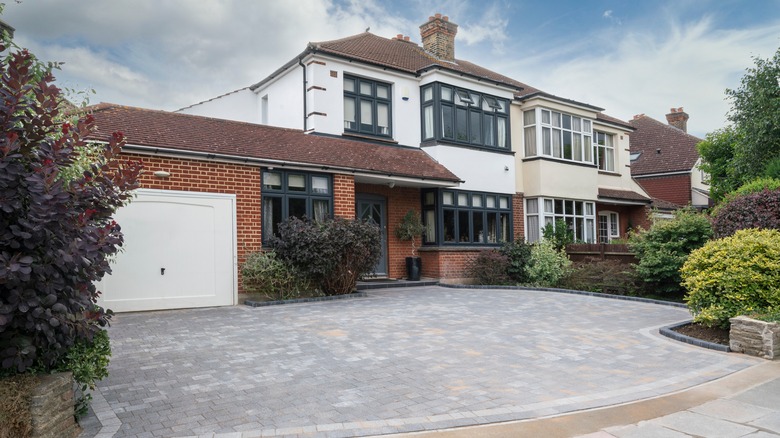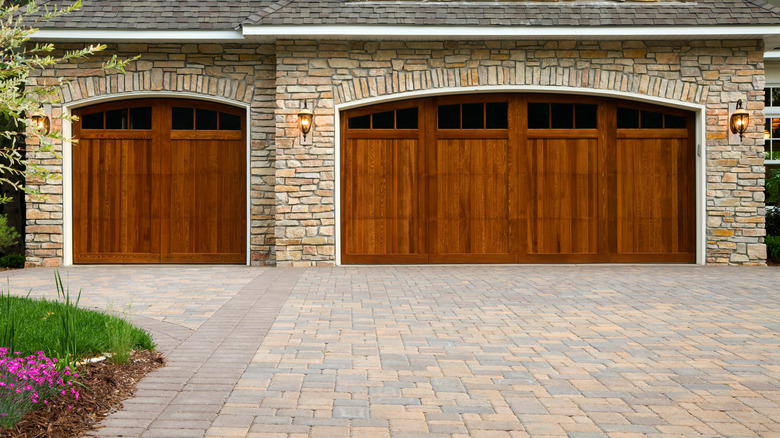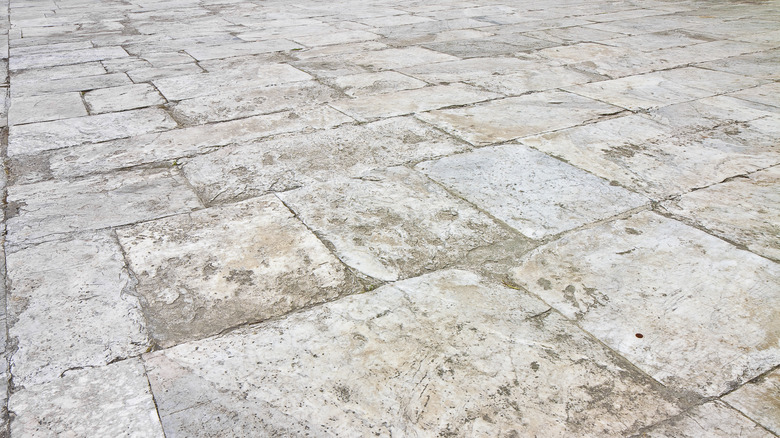The Best Paver Stones To Use For Your Driveway (& Which To Avoid)
Choosing the right material for driveway pavers can feel pretty overwhelming with all the options out there. Concrete and brick are popular choices for a reason — they're durable, relatively affordable, and offer a classic look that suits most homes. However, they're not the only options available, and depending on your specific needs, there may be better materials for your driveway. It's also important to weigh factors like durability, cost, and maintenance requirements. Some pavers that might seem appealing, such as limestone and sandstone, could end up being more trouble than they're worth due to their susceptibility to weathering and staining.
With so many materials, colors, and textures to pick from, it's easy to get confused. But getting the right pavers is important, as the best options can make maintenance easier while boosting your home's curb appeal and adding value to your property. If you're planning to sell your house in the future, research from The University of Texas at Arlington says that good curb appeal can raise your home's selling price by up to 7%. Furthermore, the state of your driveway can sometimes make or break people's first impressions of your home. Let's check out some of these options and figure out which ones are ideal and which ones you might want to skip. By the end, you'll know which materials are worth your time and money.
Popular paver materials to consider
When it comes to popular paver materials, concrete and brick are at the top of the list. Concrete isn't the most durable material but it is relatively inexpensive ($10-$20 per square foot) and available in various colors and finishes. It can be poured in place or used as precast pavers, offering flexibility in design. While concrete can crack over time, especially in areas with extreme temperature changes, occasional sealing will maintain its appearance. Brick, on the other hand, offers a classic, timeless look. It's also durable but the cost of brick pavers can be up to 20% more than concrete due to its more complex installation process. However, brick remains a cost-effective and beautiful option.
If you have the budget for premium paving options, natural stone pavers like granite and slate are your best choice. Granite is incredibly tough and resistant to weathering, which means it can handle heavy traffic without cracking. Plus, you can find granite in various colors, from deep grays to rich reds, so it's easy to match it with your home's aesthetics. While granite tends to be pricier than concrete or brick ($19-$32 per square foot), the higher cost to upgrade your driveway can make it a worthwhile investment if you want a more luxurious look.
Slate is another good choice with its layered look and earthy tones. On top of that, it's slip-resistant and durable. Like granite, it's considered a premium option, so it costs more than concrete and brick ($24-$33 per square foot).
Paver stones to avoid
While limestone and sandstone might catch your eye because of their natural appearance and lighter colors, they're generally not the best choices for a driveway. Limestone, with its soft, neutral tones, is unfortunately just that — soft. It's more porous than other stones, which means it's more prone to staining and weather damage. Sandstone has a similar story. While it's visually appealing with its warm hues and natural patterns, it doesn't hold up as well under the stress of a driveway due to its porous nature. It's also prone to erosion, meaning the surface can wear down over time, especially with the weight of vehicles constantly driving over it.
So, while both limestone and sandstone can look amazing in other parts of your landscape like patios or garden paths, they're best avoided if you want a driveway layout that's sure last and boost curb appeal. They tend to cost more than concrete and brick — ranging from $16 to $32 per square foot for limestone and $18 to $24 per square foot for sandstone. For a driveway that's both cost-effective and durable, you might want to consider more affordable and resilient options.
Another material to approach with caution is rubber. While rubber pavers are marketed as an eco- and budget-friendly option ($8-$15 per square foot), rubber pavers can sometimes shift or become uneven under the weight of heavy vehicles, leading to potential safety hazards.


